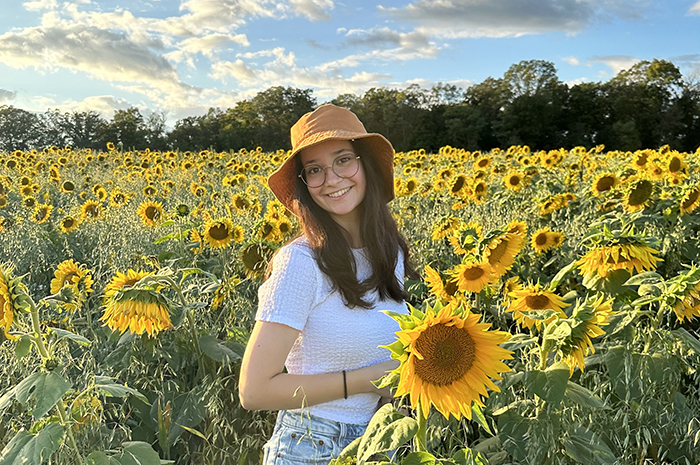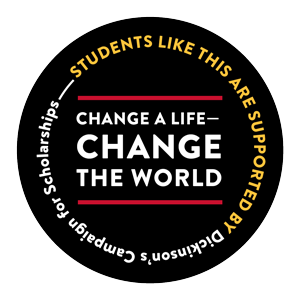Four Countries, One Campus Home

Student Snapshot: Caro Carneiro ’24
A Brazilian who’s also lived in the U.S., Argentina and Estonia, Caro Carneiro ’24 (psychology) discusses her research on human memory and how she made Dickinson her own by getting involved through MOB, a student-run organization that brings major performers to campus. She is a recipient of the Class 1902 Award, given annually to a junior who has, in the estimation of peers, contributed “the most good to the college.” Next year she'll pursue a Ph.D. in cognitive neuroscience.
Hometown:
Brasilia, Brazil.
Major(s):
Neuroscience and psychology.
Clubs and organizations:
MOB, Liberty Cap Society (tour guides), Admissions Fellows and Delta Nu. I have also been the teaching assistant (TA/QRA) for PSYC 210, a psychology-statistics class, since the semester after I took the class during my sophomore year. I’ve loved getting to help other students master class content and feel confident in their statistics skills, moving forward in the major.
Honors/scholarships/awards:
1902 Award, John Dickinson Scholarship, Psi Chi and Alpha Lambda Delta.
Best thing about my Dickinson experience:
MOB has been my favorite thing about Dickinson. I first joined during quarantine time, because I was home and needed something fun to do to pass the time. My family and I were living in Tallinn, Estonia, at the time. I joined all of the MOB meetings, no matter how late it was for me. Four years later, I have learned so much about event planning and Dickinson and also about leadership and being part of a strong group. Some of my favorite memories are from MOB events like karaoke; planning MOB the Campus and having 10 events going all at once; going to dinner with the board and just spending time in the “moffice.” MOB provided me with early opportunities for leadership and a creative outlet and has been truly a highlight of my Dickinson experience.
Favorite class:
Perception, Memory, and Thought, taught by Assistant Professor of Psychology Azriel Grysman. It was one of my first in-person classes on campus, and as a sophomore looking to major in psychology, I was so excited to learn more about the brain. I remember sitting in class and just being in awe about how the brain can manage such complex tasks and how memory and attention really work. That class truly sparked my interest in the field, and I realized I wanted to pursue it in the future. I’m going to Boston College next year for my Ph.D., and I’ll be focusing on attention, memory and perception, my genuine passion.
Fun fact about me:
I’m Brazilian and I’ve lived in Washington, D.C.; Buenos Aires, Argentina; Brasilia, Brazil; Great Neck, N.Y.; and Tallinn, Estonia. College has been the first time I’ve started and completed one unit of schooling in one place.
Favorite professor:
Professor Grysman is my favorite professor. He focuses on memory, particularly autobiographical memory, and teaches most of the cognitive courses in the department. He contacted me about potentially doing research in his lab during my sophomore year because he knew how interested I was in his Perception, Memory, and Thought class. What started off as a volunteer position in the lab during the spring semester of my sophomore year became five studies conducted throughout the rest of my time at Dickinson (including this semester, my final one). Professor Grysman taught me everything I know about autobiographical memory, retrieval-induced forgetting and the general research process. His support and mentorship have been invaluable over the years. It’s very clear how much he cares about his students and how much he is personally invested in our success.
About my research:
I am researching the role of retrieval-induced forgetting (RIF) on autobiographical memories. RIF is all about what happens when we remember something and the processes that cause similar memories to be forgotten when we do so. This project is so intriguing because this isn’t normally what people would think of when they think of forgetting; the fact that remembering something can actually backfire and cause us to forget other things is fascinating to me. Even though this project has been a ton of work, from long hours in the lab doing data collection to the memory-coding process and data analysis, it has been the most rewarding project I’ve done at Dickinson. Conducting this research has made me even more curious about the brain and memory processes, and it was important in my decision to pursue graduate school in cognitive neuroscience.
Proudest accomplishment so far:
Getting the Class of 1902 Award last year—it was a tangible achievement reflective of how my peers perceive my work for the college.
On owning the experience:
When I was looking into Dickinson, I kept seeing the phrase “Make Dickinson Yours” everywhere on promotional materials and in information sessions. I didn’t know what that meant, and I wondered how I’d be able to do that. Over the years, I’ve realized that to me, it means getting really involved on campus. I’ve taken advantage of every opportunity given to me during my time here, which resulted in a packed schedule each week, and I love it. I truly think that even though this is a small college and we all have similar opportunities available to us here, everyone does a different combination of activities and majors that results in a unique college experience.
Most important thing I’ve learned so far:
Never give up on a task, project or class just because it’s difficult. The best outcomes often come from tough situations.
Post-Dickinson plans:
Getting a Ph.D. in cognitive neuroscience at Boston College (Dr. Scott Slotnick’s lab).
Read more Student Snapshots.
TAKE THE NEXT STEPS
Published April 10, 2024